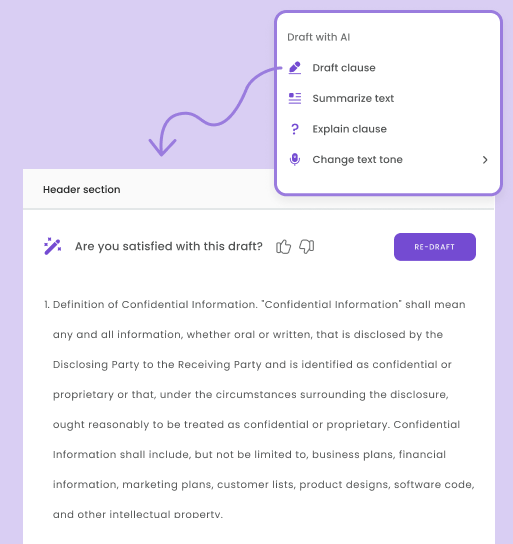There are situations in which you and another party come to a verbal agreement about services to be rendered. Often, it’s because time is of the essence and there’s no opportunity to hash out the details. While verbal contracts have their place, they should be used with caution.
In this guide, you’ll learn what verbal contracts are, how they’re applicable, the benefits they bring, and how to secure your interests with verbal contracts.
Defining Verbal Contracts
A verbal contract, also known as an oral contract, is a legally binding agreement made through spoken communication between those involved. They differ from written contracts in a key area. Written contracts are documented in some way and signed by the participating parties.
Verbal contracts are not documented in writing or signed by the participating parties. Instead, they’re based on the spoken word and aren’t formally written. That doesn’t mean they cannot be documented.
Like written agreements, they can be used for various situations. These include everything from simple exchanges to more complex business arrangements.
Keep in mind that verbal agreements should be made directly between the affected parties. It’s not like a ratified contract which can easily be confirmed later.
Legality and Enforceability:
The legality and enforceability of verbal contracts can vary based on jurisdiction and the nature of the agreement. In many legal systems, verbal agreements are generally considered valid and enforceable as long as they meet certain criteria:
- Offer and Acceptance: One participant to the agreement must make an offer and the other participant(s) to the agreement must clearly accept the offer.
- Consideration: For the agreement to be valid, there must be something exchanged by those involved – this is known as consideration. Keep in mind that consideration does not have to be of equal value. It can be money, a service, a product, or even a future promise of something.
- Intent to Create Legal Relations: The intention to enter into a legal agreement must be present and is where many verbal agreements fail. For example, an agreement between spouses, family members, friends, and other social situations often lack this intent.
- Capacity: Of course, you must be capable of entering into an agreement. A minor or those who don’t have adequate mental capacity cannot enter into a binding agreement. Even if someone is intoxicated, they cannot enter into an agreement.
- Certainty and Specificity: Just like with a written agreement, the terms must be specific and clear. This is to ensure a competent third party like a court can understand the obligations laid out in the agreement.
As you can see, the requirements are similar if not the same as the elements that make up any valid contract.
Core Components of a Verbal Contract:
There are a few moving pieces to a verbal contract. While they’re not as detailed as a written contract, they must still be present before the contract can be considered valid and enforceable.
- Offer: One party proposes a specific arrangement, indicating their willingness to be bound by the terms if the other party accepts.
- Acceptance: The other party agrees to the offer’s terms without adding conditions or changing significant aspects. This plays into the mirror image rule.
- Consideration: Both parties must provide something of value in exchange for the agreement. This could be money, goods, services, promises, or anything with legal value.
- Mutual Agreement: There must be a meeting of minds, where both parties understand and agree on the terms of the contract.
- Intent to Create Legal Relations: Both parties must intend for the agreement to be legally binding.
- Clear Terms: The terms of the agreement must be clear and specific enough to determine the parties’ obligations.
- Competency: Both parties must have the legal capacity to enter into a contract.
While verbal contracts are valid in many situations, they come with challenges. The lack of a written record can lead to disputes over the terms and obligations of the agreement. Additionally, proving the existence and terms of a verbal contract can be more challenging compared to written contracts. It’s advisable to put important agreements in writing whenever possible to ensure clarity, evidence, and enforceability.
Applicability of Verbal Contracts
Situations Where Verbal Contracts Can Be Considered:
Verbal agreements can be considered in various situations, but their enforceability and reliability can vary depending on the jurisdiction and the nature of the agreement. Whenever possible, use written agreements so that there’s a clear and obvious record of the terms and conditions.
Of course, a written agreement isn’t always possible or required. Some situations where verbal contracts can be considered include:
- Simple Agreements: The kind of agreements that can be completed quickly, are uncomplicated, and don’t require much effort are ideal for verbal contracts. For example, if you want to buy food from the store, buying alcohol, and the like can be done with a verbal agreement.
- Social Arrangements: When you’re with family and friends at informal events, you can use verbal agreements. For example, you go out and buy the drinks and I’ll set up the tables. The problem with these types of agreements is that they usually lack the intent to enter into a legally binding agreement and are hard if not impossible to enforce.
- Customary Practices: In certain industries, verbal agreements are considered common practice. It’s the way things have always been done and there’s no intention to depart from the norm. Of course, this can also present its fair share of challenges.
Industries Where Verbal Agreements Are Common:
- Small Transactions and Informal Agreements: Verbal contracts are commonly used for small transactions, such as purchasing items from a garage sale or arranging informal trades between individuals.
- Everyday Scenarios: Buying Goods, Hiring Services: Some smaller transactions don’t require a written contract or the contract may be more expensive than it’s worth. Buying goods from a market or hiring services from a local provider (e.g., lawn care, house cleaning), often rely on verbal agreements.
- Fast-Paced and Urgent Situations: In fast-paced environments, like auction houses or competitive markets, verbal agreements may be used due to the urgency of the situation.
Note that verbal contracts can be enforced, they have a peculiar set of challenges since there’s usually no record of the agreement. The major difficulty is proving that the agreement exists. Then, you have to prove the specific terms of the agreement which is significantly more difficult than with a written contract.
Due to these challenges, written contracts are preferred over verbal contracts. Of course, if it’s not possible to use a written contract, you can still take steps to properly substantiate the verbal contract. You can pull in witnesses, record it in some way, or even swear an affidavit after the fact.
It’s advisable to put important agreements in writing whenever possible to ensure clarity, evidence, and enforceability, especially for complex or high-stakes arrangements. Consulting with legal professionals can help you understand the legal implications of verbal contracts in your jurisdiction and industry.
Benefits of Verbal Contracts
Flexibility and Speed:
- Flexibility: Verbal contracts offer flexibility as they can be established quickly and informally. This is especially useful for simple transactions and agreements that don’t require extensive negotiations or complex terms.
- Speed: Verbal agreements can be made on the spot, making them well-suited for situations that require immediate action or decisions. This speed can be advantageous in fast-paced environments.
Simplicity and Ease of Formation:
- Simplicity: Verbal agreements often involve minimal formalities, which can be beneficial for straightforward transactions. Parties can agree verbally without the need for drafting and signing formal written documents.
- Ease of Formation: With verbal contracts, there’s no need to draft lengthy legal documents or involve third parties. This simplicity can make the agreement process smoother and more accessible.
Establishing Trust and Relationships:
- Personal Interaction: Verbal contracts allow for direct personal interaction between the parties. This can help build rapport, understanding, and a sense of trust, especially in small communities or local transactions.
- Informal Nature: In casual or social settings, verbal contracts may be seen as more relaxed and less intimidating, contributing to positive interactions and relationships.
- Quick Decisions: Verbal contracts enable parties to reach agreements without the delay associated with drafting and reviewing written documents. This can be beneficial when opportunities or circumstances are time-sensitive.
While these benefits highlight the advantages of verbal contracts in specific contexts, remember that relying solely on verbal agreements can have drawbacks. Verbal agreements lack the clarity and evidentiary support provided by written contracts.
Legal disputes may arise if there’s disagreement over the terms or existence of the agreement. In situations involving more complexity, substantial financial transactions, or long-term commitments, written contracts remain a preferred option. Consulting legal professionals can help you determine whether a verbal contract is appropriate for your specific situation and industry.
Potential Risks and Challenges of Verbal Contracts
Lack of Written Evidence:
- Issue: Verbal contracts lack written documentation that provides a clear record of the terms and intentions of the agreement. This can make it challenging to prove the existence and details of the contract if disputes arise.
- Risk: Without written evidence, parties may have difficulty demonstrating the terms they agreed upon, leading to disagreements and legal uncertainty.
Ambiguities and Misinterpretations:
- Issue: Verbal agreements can be prone to miscommunication and misunderstandings. The lack of detailed written terms can result in parties having different interpretations of the agreement.
- Risk: Ambiguities can lead to disputes and confusion, as both parties may have different memories or understandings of what was agreed upon.
Difficulty in Enforcing Terms:
- Issue: Verbal agreements can be challenging to enforce if one party fails to uphold their obligations. The absence of written terms can make it harder to hold parties accountable.
- Risk: In the absence of clear written terms, it may be difficult to prove the agreed-upon obligations and remedies if one party breaches the contract.
Compliance with Legal Requirements:
- Issue: Verbal contracts must still comply with legal requirements such as capacity, consideration, and intent to create legal relations. Failure to meet these requirements can render the contract unenforceable.
- Risk: Parties might unintentionally enter into contracts that are not legally valid, leading to unexpected legal consequences.
Though verbal contracts can be legally enforceable in many situations, their risks and challenges are significant. To mitigate these risks, parties can take steps such as:
- Documentation: If possible, follow up on verbal agreements with written confirmation or email exchanges that summarize the terms.
- Reducing Ambiguity: When making verbal agreements, be clear and specific about the terms, responsibilities, and expectations.
- Legal Consultation: Seek legal advice to understand the legal implications of verbal contracts in your jurisdiction and industry.
- Preference for Written Contracts: For significant transactions or agreements with complex terms, opt for written contracts to ensure clarity, enforceability, and protection.
Ultimately, while verbal agreements can have advantages in certain situations, they should be used with caution. Consulting with legal professionals is advisable to navigate the complexities of verbal contracts and minimize potential legal risks.
Legal Validity and Enforceability of Verbal Contracts
The “Statute of Frauds” is a legal principle that requires certain contracts to be in writing in order to be enforceable in a court of law. The statute varies by jurisdiction but generally covers agreements involving real property, contracts that cannot be performed within one year, promises to answer for the debt or duty of another, agreements for the sale of goods over a certain value (as per the UCC), and marriage contracts.
Burden of Proof:
In cases of verbal agreements, the burden of proof rests on the party seeking to enforce the contract. This means that the party trying to prove the existence and terms of the verbal agreement must provide evidence to persuade the court that a legally binding agreement was indeed made.
Evidence for proving a verbal contract can include:
- Witness Testimonies: Testimonies from individuals who were present when the agreement was made.
- Correspondence: Any written communication or emails that reference the verbal agreement.
- Performance: Evidence that one or both parties have performed their obligations under the agreement.
It’s important to note that while verbal contracts can be legally valid, their enforceability can be challenging due to the lack of clear written evidence. Parties should be cautious when relying solely on verbal agreements for significant transactions.
Tips for Safeguarding Verbal Agreements
Documenting Agreement Details:
- Take Notes: Immediately after reaching a verbal agreement, jot down the key details, including what was agreed upon, the parties involved, and any significant terms.
- Memorialize in Writing: Create a written summary of the verbal agreement, including important dates, quantities, and any conditions discussed. Keep this summary in a safe place.
Gathering Witnesses:
- Involve Third Parties: Whenever possible, have impartial witnesses present when the verbal agreement is made. Witnesses can provide testimonies if disputes arise.
- Obtain Signatures: If witnesses are available, consider having them sign the written summary of the agreement to attest to its accuracy.
Follow-Up Email Confirmation:
- Send a Confirmation Email: After the verbal agreement is made, send a follow-up email to the other party summarizing the key terms and confirming your understanding.
- Request Acknowledgment: In the email, ask the other party to reply, confirming that they also understand the terms as outlined.
Remember that while these steps can help reinforce the validity of a verbal agreement, they are not a substitute for written contracts, especially in complex or high-stakes situations. The goal is to provide some level of documentation and evidence in case disputes arise. If the verbal agreement involves significant obligations or valuable transactions, it’s highly recommended to consult legal professionals and consider drafting a formal written contract to ensure proper protection, clarity, and enforceability.
Conclusion
Verbal agreements are generally valid and acceptable to use for transactions. The challenge is that they’re hard to prove in the case of a dispute which is why it’s important to take steps to document them and mitigate your risk.
This guide has outlined some steps you can take such as writing down key details, using email to follow up afterward, making sure witnesses are present when making the agreement, and more.
At the end of the day, it’s recommended that you create a written agreement, no matter how simple, to protect yourself and your interests.
Let me know what you think in the comments and don’t forget to share.




